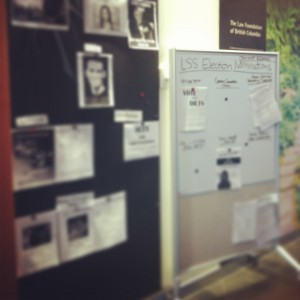I have an admission: networking terrifies me. Wine and cheese functions give me serious anxiety. I’ve observed other students networking like pros, charming everyone in their wake and carrying reams of business cards. I am not that person. However, I’ve managed to get past that and find some value in going out of my comfort zone to meet people. On some occasions I’ve even enjoyed it and have found it to be a valuable experience (for more about the value of networking, check out Beverly’s post).
During the wine and cheese functions I’ve been to, my palms have been sweaty from nervousness and I’ve been scared to shake people’s hands. Either that or my hands are full and I have to do that awkward glance around to try to find a free space to dispose of my plate and glass. When I do shake hands, people invariably comment on my firm grip (a byproduct of rock climbing). I still have yet to perfect a segue from, “My, what strong hands you have.” I’ve even had someone draw back and shake out their hand as if they were in severe pain. Apologizing for crushing someone’s bones is usually an uncomfortable way to start a conversation. I can imagine that if it were the opposite and I had one of those weak handshakes that feels like a dead fish, the ensuing conversation would be equally awkward. This brings me to my first tip:
1. Seriously consider your handshake. Maybe try it out on a few friends. At a wine and cheese function you will likely shake a lot of hands, and if you are a bone crusher/dead fish, this may not play out in your favour.
Another thing I’ve mastered is making awkward jokes that rarely get a laugh. I can’t help it; when I’m nervous I try to diffuse the situation with humour. I like puns, but not everyone does. I’ve had a few uncomfortable silences as a result of this. Until you’ve truly gauged your audience, don’t try to make them laugh. So, my tip for the awkward:
2. You might be the world’s greatest stand-up comic in your own mind, but your mind doesn’t necessarily mimic reality. Save your jokes for later.
You might see an email about a wine and cheese function and think, man, I’ve only got $0.37 in my bank account. This is a great opportunity for a free feed. If you aren’t interested in meeting anyone, then game on. But, if you actually want to use the wine and cheese as a networking opportunity, don’t get too food-focused.
3. Know your purpose. Are you actually there to meet people, or are you there for the free food? If you are actually at a networking function with the purpose of networking, take advantage of the time when the hot food first comes out to introduce yourself to a few people. Many other students will be weaving in and out of the crowd chasing crab cakes. However, if your purpose is to get a free feed, get in there early! Keep an eye on the door and suss out your hot food options.
One of my worst mistakes has been going up to an employer’s booth and starting a conversation purely because there was no one else there. This is not in and of itself a bad thing to do, but I once went up and spoke with someone from a firm that specialized in Securities Law for ages. I realized early on in the conversation that I had absolutely no idea what securities law was. I just nodded along and said, “Oh, that sounds interesting,” at what I figured were appropriate moments. I gained very little from the experience, and I’m sure that the person talking to me could tell that I was only half there.
4. Learn a bit about which firms you’re interested in and who you want to talk to. If you have a purpose, this will likely make you feel less awkward. Do some research and think of some questions you might want to ask. By doing this, you can learn quite a lot of interesting things about what life might be like working in different areas of the law.
Networking need not be a source of anxiety. It can be a perfectly enjoyable experience provided that you go prepared and with a clear focus.
Good luck, and happy networking!
